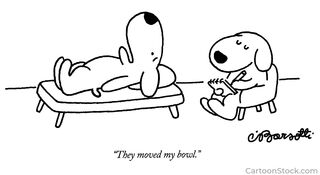Humor
How Cartoons Boost Mood and Well-Being
Cartoons offer fun, but the benefits are far more. Co-authored by Bob Mankoff.
Posted July 12, 2021 Reviewed by Devon Frye
Key points
- Empathic cartoons aid coping and resilience.
- Sharing humor and positive emotions bolster relationships and social networks.
- Stronger relationships aid health and longevity.

Co-authored by Bob Mankoff
Intuitively we know humor helps us cope. Trust your instinct on this one, and you’ll be following the science that supports it. Of course, many challenging issues require your attention, but hopefully not every second. That way lies madness—or at least sadness.
Take a break from the news and de-stress with some empathetic humor. Psychologists call this type of humor affiliative. It’s “laughing with” rather than “laughing at,” feel-good humor that makes no one feel bad.
Really? No one? Yes, that’s a tall order—but it can be filled by one of the friendliest forms of humor: cartoons.
Cartoons, Seriously
Laughing happens quickly with cartoons. Even before you “get” the joke, your experience with this domain of whimsey has set the stage for smiles and laughs. A prime example is animal cartoons. These apparently innocent creations, distanced from the complexity of human relationships, offer surprising insight into them. Whether it’s Schulz’s Snoopy, Davis’s Garfield, Calvin’s side-kick Hobbes, or The New Yorker’s Charles Barsotti, animal cartoons deliver funny—infused with feeling.
Thankfully, cartoons don’t depend on your skillful delivery or perfect timing. There’s no performance anxiety because there’s no performance. The cartoon is center stage, not you. The heavy lifting has been done by the cartoonist, setting the scene, populating it with characters and props, and delivering the punchline. Cartoons are as easy to share as memes—and more enduringly meaningful. They delight with surprise as they shift your perspective. Mutual laughter is what we’re aiming for, so pick humor that is tasteful and appropriate, and you’ll be on target. Fortunately, many cartoons fit the bill, offering laughs that connect with the head and the heart.
Cartoons can be a moment of joy amidst the stress of life. Indeed, even challenges can be an opportunity to share the gift of humor. Importantly, it’s not humor as a substitute for sadness, but rather as a kind addition. The past year has been an off-the-rails rollercoaster of emotions. Why not bring some empathic cartoons along for whatever’s coming next?
Empathic Cartoons
Diving deeper into cartoon magic, it’s apparent the cartoon frame and loveable characters are key elements. They create a safe space as they gently dissolve resistance and invite empathy. From this unassuming space, surprising insights and powerful emotions can emerge. Charles Barsotti’s famous “They moved my bowl” cartoon conveys a shared reality: “I know what it’s like to be powerless.” Such cartoons gently nudge us toward difficult emotions as they feed us comforting laughs. Try a daily dose, and savor their surprising benefits.
Sharing the Funnies
Naturally, you’ll want to share the fun. Indeed, laughter usually occurs with others and it’s even better when shared. As we laugh together, we just might realize we’re not alone. Fortified with a sense of belonging, emotions like fear and powerlessness can feel a bit lighter. Empathic cartoons can be an iceberg of insight: fun and games above water with powerfully connecting emotions like safety and belonging below the surface.
When cartoons bring laughter, they signal freedom and ease—at least in this moment. Such signals are precious, especially in our current world. Cartoons can be a key that unlocks relief and relaxation. Since emotions—including laughter—are contagious, spreading the fun just might be easier than you think.
Fortifying Relationships with Humor
Since it’s also well known that vibrant relationships—ones infused with laughter and smiles—are strongly associated with health and longevity, you’re doing yourself and others a favor when you bring the funny. Although we can’t eliminate stress and anxiety from life, sharing cartoons and empathic humor is possible, even under challenging circumstances. Keep cartoons on your radar. Have some funny at your fingertips. Restock your supplies frequently. Don’t get caught without some friendly fun to share. Know it’s an act of kindness and care.
Every Chuckle Counts
While moments of lightness and ease may seem small and insignificant, evidence suggests they contribute to well-being. As Fredrickson and others have shown, positive emotions help broaden thinking while aiding relationships, and resilience. As relationships grow and deepen, even more positive emotions can be generated—an upward spiral toward greater well-being. So, go ahead—let cartoons spark a bonfire of insight and delight. Tickle yourself, and share some fun today.
Thanks to my co-author Bob Mankoff, cartoonist and former cartoon editor of The New Yorker magazine.
References
Image licensed from www.CartoonStock.com
Martin RA, Ford T. The Psychology of Humor: An Integrative Approach. Academic Press; 2018.
Waters L, Algoe SB, Dutton J, et. al. Positive Psychology in a Pandemic: Buffering, Bolstering, and Building Mental Health. J Positive Psychol. 2021.
Kurtz, LE, Algoe SB. When Sharing a Laugh Means Sharing More: Testing the Role of Shared Laughter on Short-Term Interpersonal Consequences. Journal of Nonverbal Behavior. 2017; 41:45–65. doi:10.1007/s10919-016-0245-9.
Thoits PA. Mechanisms Linking Social Ties and Support to Physical and Mental Health. Journal of Health and Social Behavior. 2011; 52:145–61. doi:10.1177/0022146510395592.
Holt-Lunstad J, Smith TB, Layton JB. Social Relationships and Mortality Risk: A Meta-Analytic Review. PLoS Medicine, vol. 7, no. 7, PUBLIC LIBRARY SCIENCE, 2010; 7(7):e1000316. doi:10.1371/journal.pmed.1000316.
Fredrickson BL, Tugade MM, Waugh CE, et al. What Good Are Positive Emotions in Crises? A Prospective Study of Resilience and Emotions Following the Terrorist Attacks on the United States on September 11th, 2001. Journal of Personality and Social Psychology. 2003; 84:365–76. doi:10.1037//0022-3514.84.2.365.
Gloria CT, Steinhardt MA. Relationships Among Positive Emotions, Coping, Resilience, and Mental Health. Stress and Health. 2014; 32:145-56.




